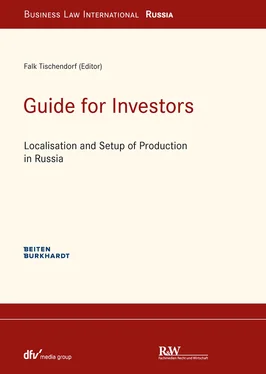The installation of infrastructure is not always a question of money: as we have seen in our practice, even those who are ready to build unloading stations for a large production facility with 12 railway lines using their own money do not receive the right to use them. In Russia this is a strategic issue, and for this reason cannot be handed over to a private foreign enterprise for resolution. Another reason is that the responsible corporate division of the state railway company will have to put this unloading station on its balance sheet and pay taxes on it. However, the indicated corporate division understands full well that its equity will predictably and naturally be reduced, while its expenses will increase due to the resultant servicing costs. For these two reasons, the director of this corporate division will not appreciate this initiative by the holding company.
7. Many investors believe that close personal contacts (for example, with the head of the region in which they plan to invest) will help them avoid a similar experience. Regardless of how pleasant the display of support by the regional heads, it must be admitted that even the governor can only offer limited assistance. There are very few who can assume the obligation to provide (guarantee the provision of) gas or electricity through one of the major utilities companies, to say nothing of the impossibility to legally force through supplies. This is due not only to political pressure, or, as Russians say, the “administrative resource”, being incompatible with compliance standards. And not only with the fact that Russian governors can be changed often and without warning. It is simply because many utilities companies today are “private” companies, which the state can no longer influence like it did in the past or which it simply does not want to influence. This is why even an agreement signed publicly with a highly placed regional official must be checked from a legal standpoint for enforceability, or even better should be concluded with the participation of the utilities companies.
8. Many of the indicated problems can be avoided by organising the production facility as a Brownfield project, under which the existing infrastructure can be used, and by agreeing on long-term supplies of power, gas, water, etc. (so-called “limits”). Unlike placing a production facility based on a Greenfield project, in which case the planned placement of federal high-voltage lines or an obsolete railway bed that could be legally considered a strategic railway line must be taken into account, a production facility created on the basis of an already existing enterprise can guard against such surprises.
Nevertheless, Greenfield projects, in which there is no risk of “old baggage” that could lead to unpredictable risks, are the most common. This, of course, is true, but one should not forget that such problems can be resolved through the performance of due diligence procedures by qualified specialists in relation to such an “inheritance”. This procedure can rule out the corresponding risk, as is the case on the performance of mandatory legal and tax due diligence. One should also not forget that here we are always talking about lower costs compared to the creation of infrastructure from scratch.
We no longer say that the investor, in the case of a going concern, may generate an income, however small, from the very first day. When creating a production facility from scratch, it will only incur expenses during the first one or two years. This fact triggers thoughts on taxes. In view of frequently unsubstantiated skepticism, certain investors also underestimate the advantages of experienced employees compared to new employees if the former have been trained and motivated for new production facilities.
9. However banal it may sound, German entrepreneurs nevertheless fail to adequately factor in that Russian employees not only have a different mindset compared to their German colleagues, but also a different level of social participation and a different education. Meanwhile the mindset and social participation depend to a large extent on the personal and social setting in which the individual develops, and that is subsequently hard to influence when it comes to education; in our opinion here the educational system, with its differently oriented curriculum, is primarily responsible.
In Russia, unfortunately, the educational system does not have “dual learning” when people receive training on practical, professional skills in addition to theoretical knowledge. Numerous German entrepreneurs accordingly decided to independently train employees so that they satisfy the requirements of their workplace. Moreover, this is happening more and more in cooperation with other enterprises as a model experiment, with a focus on dual education.
The issue being addressed here therefore does not concern only the lack of knowledge or skills, as these can always be acquired. More serious problems relate to differences in mentality and social participation. For example, it is extremely hard to explain what a German manager means when he uses the word “Mitdenken” (“thinking together”). It is worth noting that there is no comparable concept in the Russian language: this could become a serious challenge to be communicated to the Russian employee that he should in his activity always “think together”, in other words, constantly think not only about his activity and certain processes, but about the possible development and consequences of his activity. This can only be achieved in instances when such “thinking together” is communicated to employees through explanations and even for clarity through their own example, that is, “exemplify”, a word for which Russian has no direct equivalent.
Comparable efforts will be required in order to compel the Russian employee to assume responsibility. If German entrepreneurs agree with each other about anything, it is that the most complex task in Russia is to find a manager who is ready to make decisions independently and to assume responsibility for these decisions. The issue here is not that entrepreneurs want to foist their responsibility on others (that issue is governed by legal regulations), and not that they want to have a scapegoat in case of doubts, but simply that they want management personnel to take decisions independently and quickly, without searching for a safety net. And this can only be driven home based on personal experience that includes acknowledgment of errors that the individual can make.
Efforts to select the right workforce and with the help of exemplary actions to transfer to them your views on how the production process should be and what are the anticipated results are part of the process of organising production facilities, on a par with the assembly of equipment and machinery, and this needs to be recognized. However, this does not replace the need for constant technical and financial oversight. Whoever feels tired or lets their guard down should not be surprised that everything does not go as planned. Furthermore, in the production area it does not cost that much to benchmark your company against other production platforms when it comes to consumption and output in such a way that an deviations that require an explanation can be determined. Experience shows that such comparisons, if conducted regularly and popularized, can motivate employees to outperform their colleagues at the company: In Russia there are production enterprises that rank first even in terms of technical productivity globally within the framework of a group of companies. Consequently, successful examples of the set-up of production facilities show that there are no longer differences between Germany and Russia on product quality issues.
10. As regards financial indicators, then the Russian subsidiaries more often rank first in ratings as part of a concern, even if this is not always spoken of with pleasure, either for reasons of competition, or to avoid internal discussions. It must be admitted that this happened, admittedly at a time when the state of the market was different, oil prices were high and there were no sanctions. Nevertheless, regular benchmarking with the performance of other companies in one group is entirely justified. In any case, this means objective benchmarking, net of expenses that cannot be influenced by the Russian subsidiary, as they are attributable to the decisions of the head office. Every company doing business in Russia knows about transfer pricing issues. Consequently the difference in the level of prices of supplies and also when related companies provide services should be regulated by the market, and not by using excessive prices to accumulate profits in Germany where it was not in fact generated. Such practices are already under the control of the Russian tax authorities.
Читать дальше












